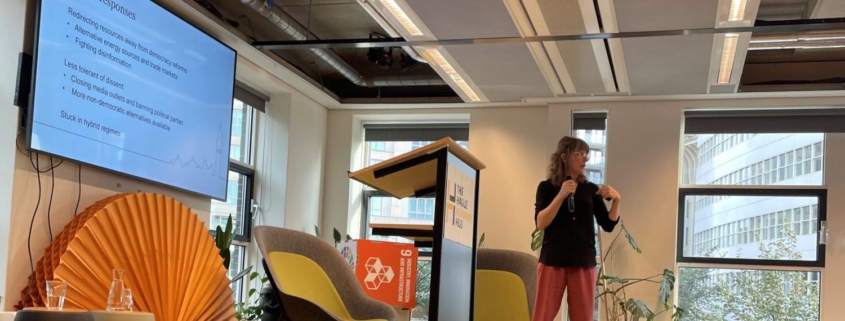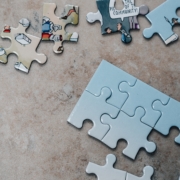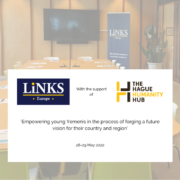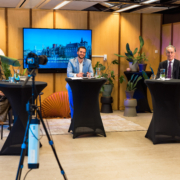Democracy Drinks The Hague: Disrupting Democracies
For the September edition of the #DemocracyDrinks The Hague we were happy to be joined by PhD researcher Amy Eaglestone from the University of Birmingham. Co-hosted by NIMD, the Netherlands Helsinki Committee and The Hague Humanity Hub, the Democracy Drinks are a monthly networking event that bring together fellow thinkers, advocates, and enthusiasts in pro-democracy spaces.
Amy focused her opening talk on Russia’s full-scale attack on Ukraine, pointing out that the attack is symptomatic of the broader tensions in the Eastern Neighbourhood. Together we explored what these tensions are, and what implications they have for the new EU-candidate countries of Georgia and Moldova?
We invite you to read Amy’s further analysis of the Moldovan situation.
The article in short
> While the EU and Russia fight it out in the Eastern European Neighbourhood, democracy in Moldova is suffering.
> Local elites’ attentions are drawn away from key reforms, and they are provided with the space to behave undemocratically.
> To address these shortcomings and consolidate democracy in Moldova the cost of making democratic choices needs to be lowered.
> This article suggests three ways to achieve this: a stronger position on democratic principles by the EU; more support for viable democratic opposition; and a socio-economic investment that shows Moldovans what democracy can do for them.
How to disrupt a democracy (and what to do about it in the case of Moldova)
Amy Eaglestone (November 25, 2023)
The countries wedged between the European Union (EU) and Russia, fall under both the European and Russian spheres of influence. In Moldova, a former Soviet state with a complicated history, this clash of interests is having a polarising effect on domestic politics, especially since the war in Ukraine, as the state and its citizens are being forced to choose between East and West, and democracy is suffering because of it. This article discusses how renewed geo-political tensions impact democracy development in Moldova, and what can be done to mitigate the negative effects. First, by considering both EU and Russian positions, then by identifying the impact on domestic politics, and finally by presenting some possible inroads for action.
EU Goals and Interests
EU policy stemming from the 2000’s identifies stability in the Eastern European Neighbourhood as essential for its own peace and stability1. The neighbourhood policy is focused on using soft power to achieve its goals. Through a series of agreements ensuring things like visa free travel (2013) and free trade (2016), the EU has tried to build closer ties with Moldova. Since the invasion of Ukraine in 2021, this integration process has come to the fore due to a heightened threat to both Moldovan and broader European security and trade routes, culminating in Moldova apply for and obtaining EU candidacy status in 2022.
Part of the EUs approach is to combine the development of economic ties with the support for governance and democracy reform. Not only ensuring shared economic interests but strengthening shared democratic values. This follows the theory that the closer cultural and economic ties a country has with Europe, the more pressure Europe (or the EU) can put on that country to improve its democracy, and the more likely a country is to want and be able to do so. Unfortunately, the EU has not always applied these dual principles consistently. During the Timofti presidency (2012-2016) for instance, the EU did not stand up to oligarch Plahotnuic, and his Democratic Party of Moldova (DPM), out of a fear for a return of the more openly pro-Russian Party of Communists, Plahotnuic meanwhile took control of the judiciary and parliament through unlawful means such as bribery and coercion. Under the current Party for Action and Solidarity (PAS) government, though to a lesser extent, some Moldovans feel the EU is again looking the other way on important issues of transparency, related to business ties of PAS-government officials and judicial appointments. This prioritisation of short term economic or security interests, over long-term goals of democratic consolidation by the EU, has left the door ajar for the influence of some domestic elites who would prefer to prevent any serious governance reform from taking place.
Russian Interference
Russia’s interests are quite like those of the EU, in the sense that they also focus on security and influence in a region that was once squarely under Soviet control.
Strong economic and cultural ties between Moldova and Russia, grew out of that Soviet period that persist today. Including a shared use of Russian as a first language among nearly 30% of Moldovans; strong trade relations and high energy dependency on Russia; and the socio-political influence of the Russian Orthodox church to which the Moldovan Orthodox church is subordinate.
To prevent Moldova from moving west and maintain its influence and ability to disrupt the region more broadly, Russia uses these ties to destabilizes the government through sharp power and weaken an already fragile democracy.
Firstly, it uses the long-standing military presence it has in the autonomous region of Transnistria to flex its military muscle and intimidate the citizens and the government. Second, it uses its economic position for leverage by banning the import of fresh fruit and vegetables for months on end or shutting down gas pipelines to force prices up. Third, it uses its significant cyber resources to spread disinformation about fighting Nazi’s in Ukraine or political actors being ‘puppets of the west’ to influence public opinion and commit financial crimes like large scale Raider attacks2 that destabilize the economy.
Russia also interferes with domestic politics directly. Oligarchs, like Plahotnuic and Shor, and presidents like Voronin and Dodon have often been linked to the Kremlin, in one way or another. Former pro-Russian president Dodon’s close advisor was a former FSB-agent, Dodon also partnered in business with the former prosecutor general of Russia3. While oligarch Shor, who is claimed to also be on the FSB payroll4 and was recently convicted on large scale fraud and corruption charges, has been linked to the funding of mass public protests against the government and attempts to unlawfully influence the 2020 and 2021 elections.
Domestic Responses
The PAS government in Moldova that won over 70% of the vote in the 2019 elections is competent but inexperienced, and while it is pushing hard to meet EU requirements to move forward with their candidacy application, it has managed to also alienate quite a large group in society. It now polls at just under 50%. Not least because of its increasingly staunch pro-EU stance in a country in which only 60% fully support closer ties with Europe5. This decreased support is problematic for democracy in its own right, as if PAS no longer holds a majority in parliament, it is unclear what will happen to Moldova’s European aspirations. There is currently no other strong pro-European party that could step in and take its place, making a long-term commitment to strengthening democracy uncertain. Until recently the largest opposition party was the populist pro-Russian Shor party, headed by oligarch Ilan Shor.
In addition, the tug of war between Western versus Russian interests in Moldova has led local political elites to exhibit three specific behaviours that harm democratic consolidation in the long term rather than support it.
First, scarce resources are being diverted towards problems created by Russia and away from much needed democracy reforms. The fight against disinformation, high energy prices, trade tariffs and financial crimes is taking away from the development and implement of much needed democracy reforms such as judicial independence and fighting corruption by the current government. For instance, when Russia drove up prices or cuts off gas supplies, the government was forced to prioritize a search for alternative energy sources and export routes that swallowed up finite resources.
Second, there is less tolerance of dissent. The PASS government introduced a state of emergency6 after the war broke out in Ukraine and it has since used this to suspend the licenses of six Russian language and Russian owned TV stations for spreading ‘incorrect information’. It has shut down public protests by staging a series of raids and arrests detaining key organisers. It also successfully petitioned the courts to ban the (largest opposition) Shor party. Though these actions may come from a legitimate concern for a fragile democracy and are perhaps the only way to address anti-democratic actors. This kind of behaviours sets a precedent for future governments as it suggests that seemingly undemocratic actions are a legitimate tool for dealing with political opposition. Which also diminishes the space for dissent in the long run.
Third, non-democratic choices remain an option. We know that to consolidate and uphold a democracy the political leaders of a country must consistently chose democracy over alternatives, in doing so, the cost of alternatives goes up and becomes less and less attractive. But in the current situation the PAS government is under tremendous pressure to make changes quickly, inviting the opportunity to cut democratic corners. While for oppositions leaders the cost of alternative options, presented by Russia rather than the EU, remain low. Why invest in party infrastructure, or public administration when informal networks and financing can continue to provide the services needed to a support base? Or why make structural changes to the judiciary if Russian trade deals do not require the same effort but do offer similar financial benefits. Those alternatives are especially attractive to politicians like Shor who themselves have vested interests in a corrupt judicial or economic system.
Inroads for Change
So, what can the international community do to support democratic consolidation in this environment? It can pursue three inroads that will lower the cost of democracy for domestic actors and increase the likelihood of local elites making pro-democratic choices.
First, the EU needs to stick to its position, and not oscillate between its economic and security interests and its claim of wanting to have and support strong democratic values. By not taking a consistent stance it is slowing but surely losing its credibility amongst domestic actors as a reliable democracy supporter. Political elites are learning that the EU may well be lenient towards them if they confidently meet the economic and security requirements of an agreement, while lagging on governance reforms. While Local pro-European civil society are feeling let down by the EU. By being more principled the EU will become a trusted partners with clear expectations regarding democracy.
Second, there needs to be a serious investment in democratic alternatives. When only one pro-European party can challenge for, or hold, office, the country’s EU relationship and its democratic ambitions can find themselves in a precarious situation. Besides PAS, the only viable political alternatives at the moment hold much more pro-Russian positions, a vote against the government automatically becomes anti-European, and leans towards political leaders who support more authoritarian views. By investing in the growth of alternative pro-European parties or movements with potential, the electorate will be able to choose among two or more parties that represent different interests but that all strongly support democracy. Those parties will be able to join forces if needed in a coalition or concede to one another without the country most certainly having to digress from its democratic course with a change of government. The necessity of multi-party approach is also highlighted by NIMD, as the organization works to bringing together political parties together through dialogue.
Third, the EU and its member states need to show the citizens of Moldova what the spoils of democracy look like.
For instance, by actively and visibly working to improve security and reduce poverty, as was also crucial in bringing the Baltic states on board. In essence replenishing the resources that are currently being depleted fighting off Russian interference. Then, citizens can rationally and consistently choose democracy over any lingering Soviet nostalgia, and also continue to pressure any future governments to do the same.
In short, though Russia is doing its best to exploit weaknesses in Moldovan democracy, it is possible for the international community, including organisations such as NIMD, to offer some rebuttal that will improve its chances of long-term survival.
Article provided by NIMD









